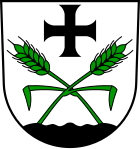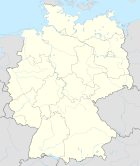Flesh cheeks
| coat of arms | Germany map | |
|---|---|---|

|
Coordinates: 47 ° 53 ' N , 9 ° 29' E |
|
| Basic data | ||
| State : | Baden-Württemberg | |
| Administrative region : | Tübingen | |
| County : | Ravensburg | |
| Local government association: | Altshausen | |
| Height : | 628 m above sea level NHN | |
| Area : | 5.8 km 2 | |
| Residents: | 702 (December 31, 2018) | |
| Population density : | 121 inhabitants per km 2 | |
| Postal code : | 88373 | |
| Area code : | 07505 | |
| License plate : | RV, SLG , ÜB , WG | |
| Community key : | 08 4 36 032 | |
| Address of the municipal administration: |
Rathausstrasse 19 88373 Fleischwangen |
|
| Website : | ||
| Mayor : | Timo Egger | |
| Location of the municipality of Fleischwangen in the district of Ravensburg | ||
Fleischwangen is a municipality in the Ravensburg district in Baden-Württemberg .
geography
Geographical location
The community is located in the northwest of the Ravensburg district in the source area of the Ostrach , on the edge of the Pfrunger Ried landscape protection area .
geology
There are natural gas deposits at Fleischwangen .
history
Early history
Fleischwangen was first mentioned as Flinxwangun in 808 in connection with a takeover of the St. Gallen monastery . The Allerheiligen monastery in Schaffhausen had owned the local area since 1092 . In 1116 the name appears as Flinswangin in a document (from Flins = pebble and wang = field).
Local nobility is documented from 1281 to 1391. The successors of these Lords of Fleischwangen were the Lords of Ringgenburg (based on the Ringgenburg near Esenhausen, today in Wilhelmsdorf ). In 1296 Johannes von Ringgenburg gave the place and the patronage of the parish church St. Felix and Adauktus as well as the place Esenhausen to the Teutonic Order , which later incorporated the property into the Teutonic Order Coming Altshausen . John made the gift to the Order out of gratitude that two sons had been accepted into the Order. The son Johannes von Ringgenburg d. J. is documented as Commander in Altshausen in 1361. In 1363 Esenhausen was sold to Weingarten Monastery , while Fleischwangen remained part of the Teutonic Order for the next few centuries.
Most of the town burned down in 1647.
19th and 20th centuries
In the course of secularization , the area of the Kommende Altshausen first became part of the Kingdom of Bavaria in 1806 , then part of the Kingdom of Württemberg in 1807 , where it was assigned to the Saulgau District Office. In 1810 King Friedrich von Württemberg exchanged the rule of Altshausen for his rule of Weiltingen, which had ceded to Bavaria. Fleischwangen now belonged to the private property of the royal family and was administered by the Altshausen court chamber office. The current municipality of Eichstegen was formed around 1825.
The Zippern parcel was first mentioned in 1829 (today Zipperhof).
Until 1972 Eichstegen belonged to the district of Saulgau , after its dissolution the community became part of the district of Ravensburg on January 1, 1973.
Since January 1, 1972, the community has been a member of the Altshausen community administration association based in Altshausen .
Population development
- 1825: 203 inhabitants
- 1900: 316 inhabitants
- 1961: 341 inhabitants
- 1970: 415 inhabitants
- 1975: 430 inhabitants
- 1991: 449 inhabitants
- 1995: 521 inhabitants
- 2005: 629 inhabitants
- 2010: 658 inhabitants
- 2015: 674 inhabitants
Religions
Fleischwangen is - like the whole region - Roman Catholic . The Catholic residents belong to the parish of St. Felix and Adauctus, consecrated to two Roman martyrs and belonging to the Saulgau dean's office in the Rottenburg-Stuttgart diocese . Its catchment area extends beyond the political municipality of Fleischwangen. The church was first mentioned in a tax register in 1275.
The Evangelical Lutheran Christians in the community belong to the Altshausen parish, in the Biberach church district of the Evangelical Church in Württemberg .
politics
Municipal council
In the local elections on May 25, 2014, three women and five men were elected to the eight-member local council by majority vote.
mayor
On October 12, 2014, the then 25-year-old Timo Egger was elected mayor of Fleischwangen with 80.13% in the first ballot. This made him the youngest mayor in Baden-Württemberg and even in Germany. The previous incumbent, Roland Fuchs, was no longer running.
coat of arms
Blazon : Two green ears of wheat growing diagonally in silver from black soil, above a black Teutonic Cross.
A coat of arms showing two crossed hammers is proven for the local nobility of the 13th and 14th centuries. When, in 1975, the council of the municipality of Fleischwangen, which until then had no coat of arms, suggested the creation of a coat of arms at the instigation of the local music association, a proposal by the Stuttgart State Archives to adopt the coat of arms of the local nobility was not implemented.
The coat of arms, which was ultimately awarded in 1976, shows a Teutonic Order Cross (which refers to over 500 years of membership in the Altshausen Teutonic Order ) as well as two green ears of corn, which are intended to illustrate the rural character of the settlement.
Culture and sights
In addition to the rural youth , the volunteer fire brigade and church groups such as the church choir or the blood rider group (participants in the annual rider procession Blutritt in Weingarten ), the following associations in particular are active in Fleischwangen's social life:
- The fools association Bure-Meckeler Fleischwangen e. V. (beginnings in 1975, officially founded in 1996) with around 120 members organizes the Swabian-Alemannic carnival .
music
The Musikverein Fleischwangen , founded in 1923, performs on secular and ecclesiastical occasions.
Buildings
- Parish Church of St. Felix and Adauctus (Gothic, with late Gothic wall tabernacle, high altar with coat of arms of the Teutonic Order)
- St. Anna cemetery chapel
Sports
The sports club Fleischwangen e. V. (founded in 1956) offers not only football (district league B, as of 2006) but also a department for recreational sports.
Economy and Infrastructure
The most important branch of the economy is craft with numerous local businesses. For a long time, the townscape of Fleischwangen was largely characterized by agriculture, in particular dairy farming and grain cultivation. In addition to fruit growing, pigs are mainly farmed today. Two small country inns offer Swabian specialties.
traffic
Since 1925 the community can be reached by bus (initially “Kraftpost”). A bus connection now connects Fleischwangen with Ravensburg , Wilhelmsdorf , Ebenweiler , Guggenhausen , Unterwaldhausen and Altshausen . The community belongs to the Bodensee-Oberschwaben transport association (bodo).
education
The primary school Fleischwangen was founded in 1836 and received a new house in 1905. Today, classes are held in a school building from 1965. 1976–1990 the school was operated as part of the Riedhausen elementary school. Since 1990 the small school with around 50 students has been independent again. The catchment area also includes several suburbs and hamlets in the surrounding communities. There is a kindergarten for the youngest residents .
There are secondary schools in nearby Altshausen and in Wilhelmsdorf .
Others
Fleischwangen has always been known for its special child-friendliness: in 1900 Fleischwangen was the village with the largest number of children in the Kingdom of Württemberg. Even today, Fleischwangen has the lowest average age of the communities in the Ravensburg district.
literature
- Chronicle of the Ravensburg district. Landscape, history, customs, art . Chroniken-Verlag Boxberg. Hinterzarten 1975
- Oskar Sailer (ed.): The district of Ravensburg . Theiss. Stuttgart 1976. ISBN 3-8062-0145-5
- Josef Mütz: 1200 years of Fleischwangen - history, stories and Gschichtla . With a contribution by Eberhard Fritz. Bergatreute / Aulendorf 2009. ISBN 978-3-89089-152-1
Web links
Individual evidence
- ↑ State Statistical Office Baden-Württemberg - Population by nationality and gender on December 31, 2018 (CSV file) ( help on this ).






